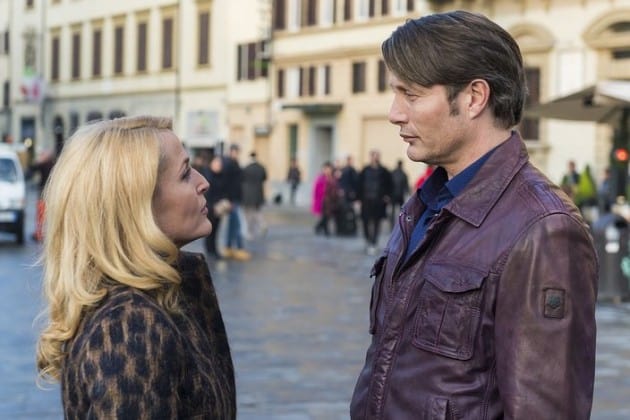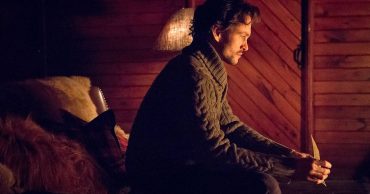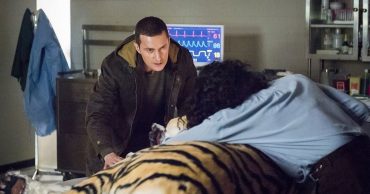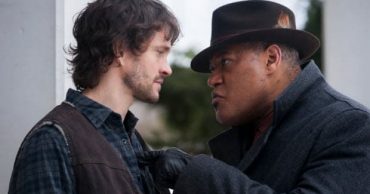
In the gloom of Lithuania, Will Graham and Chiyoh come to agree on at least one thing: “All sorrows can be borne if you put them in a story.” Fiction as a coping mechanism is not something unfamiliar to readers of books and viewers of film and television. Often, the willingness to give yourself over to a story comes from its potential to be cathartic, since you can live vicariously through its characters without having to experience their pain first-hand. Or, if that kind of pain has already been experienced, the story helps shoulder some of it by creating the illusion that you are sharing that experience with someone else. “Secondo” shows how the story of Hannibal also helps us bear something other than sorrow–horror. Not strictly a horror series, Hannibal terrifies in ways that are more psychological and philosophical than physical and immediate. It is by taking on the traits of Will Graham–getting into the characters’ heads–that we experience that horror most fully. And, more so than any image in “Secondo,” including Will’s display of the prisoner’s corpse or Hannibal’s impulsive behavior, the line of dialog that strikes me as most horrific is Hannibal saying “Nothing happened to me. I happened.”
When villains in stories have recognizable motivations, the understanding of them becomes somewhat of a comfort. Iago, often considered Shakespeare’s greatest villain, conducts the manipulation in that tragedy partly for his own ends but also out of jealousy. Those impulses are recognizable in the nature of the human being and, even if readers or audience members would never take them to the extent Iago does (we hope), Iago is a character who isn’t alien. King Lear‘s Edmund, though, is a different beast of a villain. Even though it seems his actions also come from jealousy (Edmund is an illegitimate son and must stand back in the shadow of his legitimate brother), some of his final lines betray those apparent motivations: “Some good I mean to do, despite of mine own nature.” As in, Edmund is just naturally evil. This, I think, is a much more troubling idea to come to terms with, and it’s one that Hannibal Lecter also forces us to think about.
“Nothing happened to me. I happened.” At this point, Bryan Fuller has tweaked Thomas Harris’ narrative enough that I don’t feel like referencing Hannibal Rising is much of a “spoiler,” but if you’re worried about reading what happens to Hannibal and his sister in that prequel novel, skip the rest of this paragraph. The horror of Mischa’s fate in Hannibal Rising certainly informs that character we see in this series, and some of that has been touched on in these early season three episodes. That Mischa was killed and served to Hannibal, who wasn’t fully aware until after the fact, says a lot about how Bryan Fuller’s Hannibal conducts his extracurricular business and dinner parties. It’s not just that the rude must be eaten; the ways in which Hannibal serves his food are important, too. But more important is that the whole experience, which presumably set Hannibal off on the path to his becoming, isn’t something that he believes happened to him. For him (and this is something I agree with based on my personal interpretation of the character we see in this series), the idea of Hannibal Lecter (or Hannibal the Cannibal or the Chesapeake Ripper or the Devil) was already within that boy. All that Mischa’s death did was open the door for him. The distinction is an incredibly important one, just as the distinctions between dissection and appreciation and observation and participation have been important to the first two episodes. Hannibal was never an Iago who became what he is for reasons that are clear and traceable. Hannibal is an Edmund–a natural evil that would have shown itself regardless of Mischa dying.
Like sorrow, horror like this needs help to be borne. In our own lives, we may very well recognize this kind of natural evil, whether we see it in someone or something. And because of its nature, it is hard to cope with. Put another way, it is more difficult to be angry with someone for doing something “bad” if it is simply in his nature to be bad than it is to be angry with someone who has done something bad out of spite or revenge. Hannibal, then, offers us the best way of trying to reconcile evil in its natural form by analyzing Hannibal just as heavily as it analyzes Will Graham, which is why we see Will coming to Castle Lecter to explore Hannibal’s origins and why he projects a therapy session with the doctor, synthesizing each character’s mind palace. By spending so much time in the mind and life of Hannibal Lecter (you’ll notice below that Hannibal has more lines than any other character in this episode, which hardly feels correct given how prominent Will’s story is), we can begin to see how natural evil thinks and operates. There probably never is going to be a point at which Hannibal can be wholly understood, but–also like sorrow–partial relief is certainly better than none.
This, of course, presupposes that the viewer is someone who wishes to engage Hannibal on those terms. He can just as easily be enjoyed for how charismatic he is. And another kind of viewer could absolutely take the position that his actions are explained by his background. In this episode, Bedelia suggests that his recipe, originally meant for his sister, has been perfected over the years, which is simultaneously a knowing nod to Hannibal’s cannibalism but also a more subtle comment on how Hannibal might be trying to do justice to Mischa’s memory. It makes dealing with the character easier, though it seems counterintuitive to believe that Fuller wants the easier explanation in this case. Like director Vincenzo Natali’s film Cube (Natali has directed these first three episodes), the purpose behind the evil seems to be that there is no discernible purpose. At least, not in the way that gives us the comfort that we often crave when trying to understand something foreign to us. Again, that reality is more terrifying, but it might also be the one that teaches us more about ourselves.
Bite-Sized Thoughts–Buon appetito!
– Apologies for the self-promotion, but if you enjoy Hannibal and want to hear me and my co-host talk with director Vincenzo Natali on our Hannibal podcast, This is Our Design.
– Also needing to bear sorrows is Jack Crawford, who makes somewhat of a triumphant return in this episode. Great to see him, but there’s a definite melancholy hovering around his character, which I’m sure has a lot to do with all these memories being dragged up by following Will. Another unfortunate but safe assumption? Bella is probably dead by now. She was in bad shape when we left her in “Mizumono”; the good news, I suppose, is that I’m sure we’ll get a flashback of some sorts that does justice to her character and Gina Torres’ fantastic portrayal of her.
– “Betrayal and forgiveness are best seen as something akin to falling in love.” Better stop that, Bedelia. You’re going to get the Will-Hannibal shippers going.
– That therapy sequence was partially shot behind beveled glass, with Hannibal’s face shattering at the end of it. This is, without a doubt, one of my favorite visual metaphors this season and is gorgeously shot.
– We welcome Chiyoh to the Hannibal party in a powerful way, wielding that shotgun and committing murder in self-defense (always an important capacity to have in this series). She is, though, manipulated by Will into doing it after having been manipulated by Hannibal into keeping the prisoner alive. Has Will turned into the more psychologically powerful character…?
– …or has he just gone crazy? Because…Hannibal is not going to see that dragonfly display. Hannibal said he doesn’t believe he’ll ever return home, and since Will and Chiyoh have left Lithuania, it makes Hannibal’s return to Castle Lecter even less likely. So, Will just strung the prisoner up, because…he felt like it? He wanted to defile Hannibal’s home? He wanted to take something away from Hannibal in the same way that Hannibal took something important away from him? All viable options, but Will seems to revel in it, which is a little troubling after last season’s back-and-forth “Which side is Will on?” game.
– “That may have been impulsive.” ‘Nuff said.
– “Technically, you killed him.” Nice to see that Hannibal has not lost his sense of humor.
– Best transition of the episode: Hannibal’s face appearing in Will’s cup of tea (I think it’s tea…).
– The question that Bedelia brings up to Hannibal about why he seems to be drawing people to him after fleeing the country and establishing a cover is an interesting one. Ultimately, this probably comes down to how powerful his relationship with Will is. Even after all that has happened, and especially after being forgiven by Will, he needs and misses his former peers. Recalling “Mizumono,” Hannibal never wanted to kill Jack, since he considered Jack one of his friends. If Hannibal believes he can’t escape the reckoning that was promised to him, it would make sense to want to be taken by the people he loves.
– “Our minds concoct all sorts of fantasies when we don’t want to believe something.” Interestingly enough, Will’s mind concocts all sorts of fantasies when he needs to believe and understand something. But then Will has always been a little different, hasn’t he?
– Case in point: “I’ve never known myself as well as I know myself when I’m with him.” It’s certainly a troubled relationship, to use the understatement of the century. And, without getting too far ahead of myself, I’m especially interested to see how the relationship develops once it’s Hannibal who in custody and Will on the other side of the glass.
– “I have to eat him.”
Hannibal by the Numbers:
Speaking roles in “Secondo”
1. Hannibal, 61 lines
2. Chiyoh, 50 lines
3. Will, 46 lines
4. Bedelia, 36 lines
5. Jack, 23 lines
6. Prisoner, 15 lines
7. Pazzi, 14 lines
8. Sogliato, 9 lines
9. Mrs. Albizzi, 5 lines
10. Mr. Albizzi, 2 lines
Total: 261 lines
33 total scenes
Longest scene by line count: tie between dinner with Sogliato and dinner with the Albizzis, 28 lines
Shortest scene by line count: 17-way tie, 0 lines
Extraneous observation: a different new character has had the second largest in role based on number of lines in each of the first three episodes of the season (Dimmond, Pazzi, Chiyoh); each character also comes from a different country
 Follow Us
Follow Us






Did you know that the urban dictionary term shipper originated from the X-Files, where people wanted Mulder and Scully to hook up? Things are coming full circle.
I know we’re getting a proper X-Files reunion, but how amazing would it have been to have David Duchovny play Bedelia’s former patient?